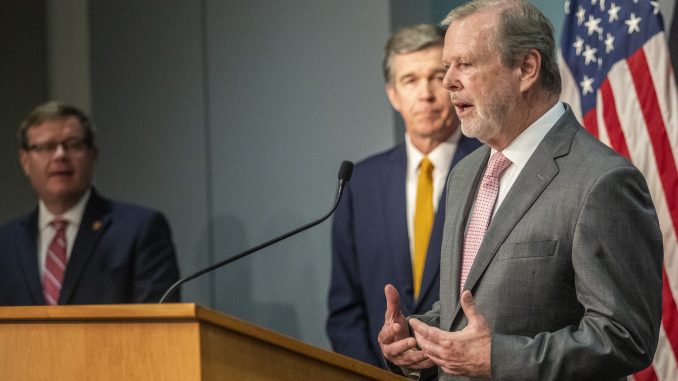
RALEIGH — The North Carolina legislature’s “short session,” which takes place on even-numbered years, has begun in earnest. Senate Leader Phil Berger (R-Eden) held a press conference Monday to offer press and the public an idea of what his chamber’s Republican majority would be pursuing in the following weeks.
Berger said the legislature needed Gov. Roy Cooper’s administration to provide more information on several areas so the legislature can proceed with an accurate picture — highlighting specifically COVID-19 testing data from the Department of Health and Human Services, data on unemployment claims from the Department of Commerce, and information on overspending by the Department of Transportation.
“I think all of those things are things that are ripe for legislation and are ripe for the legislature to call on the executive branch to provide us and the people of N.C. with answers,” Berger said.
While he said he’s “got some ideas” for fixes in these areas, Berger said they are at a preliminary stage and haven’t been fleshed out fully into legislation.
“The most important thing is that we get answers from the Department of Commerce as to what they’re doing to move things along,” Berger said on the reports of chaos in the process of getting unemployment checks out to the historic numbers of North Carolinians now unemployed. “We keep hearing that they’re hiring additional people, but that doesn’t seem to be moving the needle.”
A priority of the session will be to make adjustments to the biennial budget. After the last budget was vetoed by Cooper, the state has been operating with funding levels from the previous biennium. With the pandemic crippling tax revenue, Berger suggested this likely would not be the time to consider an expansion of Medicaid or providing additional raises for teachers.
“Before COVID-19 hit our state, we were looking at a significant surplus. Now, our nonpartisan fiscal staff is estimating a multibillion-dollar revenue shortfall,” Berger said.
A question was posed to Berger on whether, despite these cratering revenues, a court case in progress could force the legislature to raise education funding based on the 1997 Leandro decision, which ruled that a child has a “right to a sound basic education.”
“We can’t spend money that we don’t have,” Berger responded. “Our constitution does not provide for judges to appropriate dollars. We’ve said on multiple occasions that if judges want to get into the field of appropriating, they need to run for the legislature. We’ll see what the order is, but again, we cannot spend money we do not have.”
Berger did say the Republican majority would try to avoid the level of cuts that Democrats made to education during the Great Recession more than a decade earlier.
In a sign that the session could also feature a battle with Cooper over the pace of reopening the economy, Berger called for restaurants and other businesses that have been shut down or forced to limit activity to be permitted to open again to the public. One reporter asked why Berger was calling for restaurants to reopen when her newspaper had spoken with many restaurant owners who said they were not yet ready to welcome back customers.
“So, I’m not saying they’d be required to reopen,” Berger responded. “And I’m not sure how many ‘many’ is. I’m sure there are a large number that want to reopen even under reduced capacity. I think the fact that some don’t want to means that people will have to make their own decisions about what’s safe and what’s not safe.”
Berger said the session, which traditionally tries to wrap up before the Fourth of July holiday, would only take four to six weeks and be out before the end of June.


